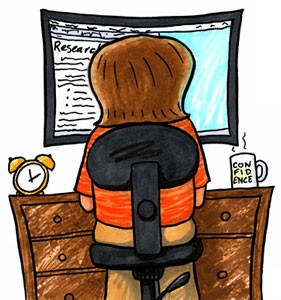It is really easy to overvalue tasks that other people ask you to do or see you doing. And to undervalue the tasks you do alone.
Writing happens alone. Sometimes it doesn’t even look like work, especially when you have to do a lot of thinking. It takes a long time to get a product that means anything to your colleagues (like a publication). And yet, publications are built from a whole series of tasks that happen in separate time slots, some of them as short as 15 minutes. It’s not that writing is necessarily more important than anything else on your list. However, it is more important than a lot of things on that list. And it is real work, not a hobby.
On the Hook and Eye blog, Aimée Morrison wrote about what she could do in 30 minutes and how that made her rethink the way she responded to requests for her time.
Before I give it away, I measure my time by what I could get done with it: if a 20 minute meeting on campus means 30 minute commute each way, then I know I could read an entire article, or prep two classes, or write 1000 words of freewriting–is the meeting that important? Or can it wait until I’m already on campus and it will ‘cost’ me less time? Or, better, can we do it over the phone? (Hook and Eye: 30 Minute Miracle: A Measure of Faculty Time.)
(Go read that post. It contains a great list of stuff you can do in 30 minutes. YMMV though so start keeping track of what you can do in 30 minutes.)
One writing or reading session isn’t going to accomplish anything you can put on your annual report. Attending one meeting might. But that doesn’t mean the meeting is more important than the writing.
 Scheduling all your tasks
Scheduling all your tasks
Whether you do this in your calendar (paper or electronic) or in your head, it is important that you think of your daily/weekly schedule as including the things you do alone. And it’s not just writing. When do you do teaching preparation? Are you scheduling time for that?
It is too easy to look at your calendar and see a lot of “available time”. Someone asks if you can do something and before you know it all your writing time has gone out the window.
Yes, you can be flexible. But you don’t have to be. And you need to see a place where you can move your writing time.
If your institution uses a calendar (like Outlook) that enables colleagues to see your availability when they propose meeting times, it is even more important to physically schedule tasks like writing and teaching preparation (i.e. tasks you do alone) into your calendar. Colleagues can only see that you are busy, so you don’t have to worry about what you put in those slots, as long as you make them “busy”.
You can limit your availability
You can’t act as if the only important tasks are writing and anything else is some kind of imposition on your time.
However, you can limit your availability for those other tasks within reason. Consider the range of your required tasks and allocate an appropriate proportion of your time to the “alone” tasks.
If you prefer to do those alone tasks at home rather than in the office, organize the various tasks so that you minimize your travel time back & forth to campus.
If there are “normal” times for certain meetings, leave those times available. You can then use that slot for more types of meetings than the ones that normally occur there. For example, if you normally have department meetings on Thursday afternoons, but they only happen 3 times a term, you have all the other Thursday afternoons available for other kinds of meetings. And if you get to Thursday afternoon and nothing is scheduled, you can revel in the extra writing or teaching preparation time.
You are not being a bitch
I feel kinda like a bitch, frankly, insisting in the ways that I now find myself doing, that my time is valuable and I will split my 40/40/20 to maximize my own productivity. (Aimée Morrison in that Hook & Eye post)
There is a lot of room between not meeting your collegial obligations and subordinating your own best interests to anyone who walks in and asks you to do something. You are not a selfish bastard.
You can offer alternative times or modes of meeting. You can suggest someone else who might be better suited to the task.
You might also need to change your expectations of how much time you should devote to teaching preparation, and find ways of using 30 minute or 1 hour chunks of time to advance your research.
Related Posts
It’s not too late to adjust your plans
This post was edited Sept 15, 2015, and again on August 24, 2017.









Leave a Reply